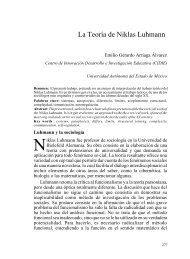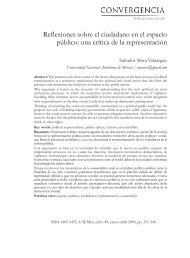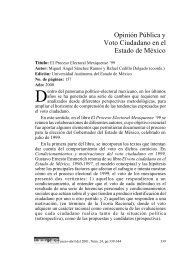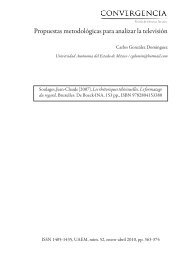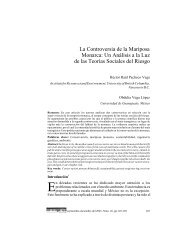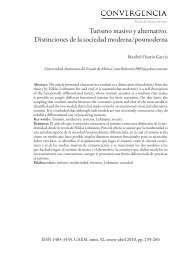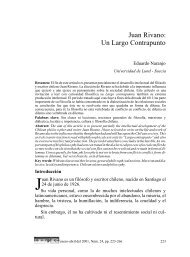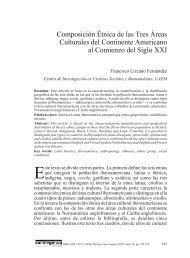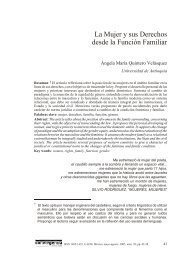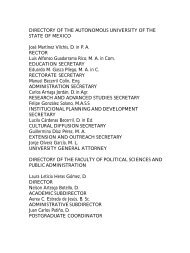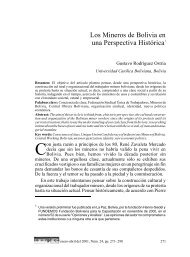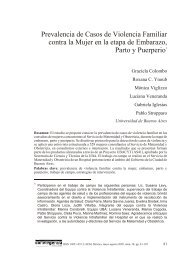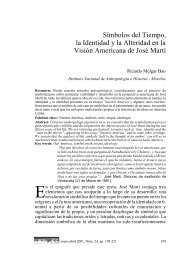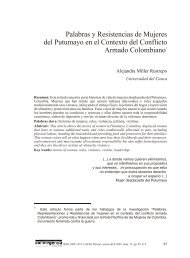Liberalism and democracy from Norberto Bobbio's ... - Convergencia
Liberalism and democracy from Norberto Bobbio's ... - Convergencia
Liberalism and democracy from Norberto Bobbio's ... - Convergencia
Create successful ePaper yourself
Turn your PDF publications into a flip-book with our unique Google optimized e-Paper software.
CONVERGENCIALuis Antonio Córdoba Gómez, <strong>Liberalism</strong> <strong>and</strong> <strong>democracy</strong><strong>from</strong> <strong>Norberto</strong> Bobbio’s perspectiveRevista de Ciencias Sociales<strong>Liberalism</strong> <strong>and</strong> <strong>democracy</strong> <strong>from</strong> <strong>Norberto</strong>Bobbio’s perspectiveLuis Antonio Córdoba GómezUniversidad del Cauca, Colombia / lacordoba2004@yahoo.esAbstract: In the present article an analysis is developed, approached <strong>from</strong> the political philosophy, onthe conception the Italian philosopher <strong>Norberto</strong> Bobbio (1909-2004) outlined about two of the mostimportant political traditions produced by the western culture <strong>and</strong> which are, without a doubt, pillarsupon which modernity has been built: <strong>democracy</strong> <strong>and</strong> liberalism. From this perspective approaching<strong>and</strong> encounter points are identified, the same as the tensions that energize the relationship between<strong>democracy</strong> <strong>and</strong> liberalism as well as some contradictions that spur Bobbio’s thought.Key words: Democracy, liberalism, political liberalism, liberal State, liberal <strong>democracy</strong>.Resumen: En el presente artículo se desarrolla un análisis, abordado desde la filosofía política, entorno a la concepción que el filósofo italiano <strong>Norberto</strong> Bobbio (1909-2004) planteara acerca de dosde las más importantes tradiciones políticas que ha producido la cultura occidental, y que son, sinduda alguna, pilares sobre los que se ha edificado la modernidad: la democracia y el liberalismo. Desdeesta perspectiva se identifican aproximaciones y puntos de encuentro, lo mismo que las tensiones quedinamizan la relación entre democracia y liberalismo, así como algunas contradicciones que permeanel pensamiento de Bobbio.Palabras clave: democracia, liberalismo, liberalismo político, Estado liberal, democracia liberal.ISSN 1405-1435, UAEMex, num. 48, September - December 2008, pp. 19-3819
<strong>Convergencia</strong>, num. 48, September -December 2008, UAEMex, MexicoIntroduction 1When we refer to the relationship between liberalism <strong>and</strong> <strong>democracy</strong> wecommonly suppose or suspect that both political categories are close to eachother, either because they are too familiar to us or because, in other words,they are very common. The intertwinement that we suppose between themis nourished, obviously, by any discursive <strong>and</strong> ideological charge that, in thedaily life acts, is spread having as source different origins (mass media, politicalspeeches, demonstrations, et cetera). Don’t we even mention a democraticliberalWeltanschauung? Don’t we even refer nowadays to a liberal <strong>democracy</strong>that not only st<strong>and</strong>s triumphantly, but which is also pompously said to behealthy?Obviously, one thing is to take for granted that this relationship betweenliberalism <strong>and</strong> <strong>democracy</strong> exists, <strong>and</strong> another one, as it corresponds to theintellectual work that the political philosopher has to perform, is to demonstrate<strong>and</strong> clarify its meaning, to clarify at which historical moment <strong>and</strong> how thefusion took place, which divisions can be determined, what tensions arise,which bridges or ideological rapprochements ease establishing a conciliationthat we could call effective, as well as which conditions of the politicalenvironment in the society encourage controversy. It is necessary to tacklethese <strong>and</strong> other concerns given their significance <strong>and</strong> complexity. The analysis<strong>and</strong> reflection on these two political practices around which the current social<strong>and</strong> economic life revolve becomes a more important situation after the fallof the real socialism that left liberal <strong>democracy</strong> without its natural antagonist.After all, such task involves the knowledge aspect, both in the ethicalimperative that encourages us to continue speaking about things that havealready been said, a part of it which is to assume detachments or controversieswith ideas or points of view that are not shared, <strong>and</strong> with regard to theexpectations that arise based on what is expected to be said. To take part inthe theoretical debate as well as in the production of knowledge, whichever1The present article is part of the research project the author develops inside Culture <strong>and</strong>Politics Group (Grupo Cultura y Política), which he belongs to. Said group is ascribed to thedepartment of Philosophy of Universidad del Cauca <strong>and</strong> is recognized by Colciencias inCategory B.20
Luis Antonio Córdoba Gómez, <strong>Liberalism</strong> <strong>and</strong> <strong>democracy</strong><strong>from</strong> <strong>Norberto</strong> Bobbio’s perspectivethe topic is, does not set us in the position of neutral or dispassionate subjects,but in the position of individuals who cannot establish radical detachmentsto the concerns that the political flux poses, an issue of utmost importanceif we bear in mind the future of our societies.For instance, when we have the belief that we have just spoken little aabout a specific problem, that we have barely taken charge of it, not onlycan we cast doubt on the roles that have been performed, but we shall alsounderst<strong>and</strong> that to undertake a task of conceptual clarification (extremelynecessary) is, at the same time, big <strong>and</strong> challenging. But if we consider theopposite situation, that is, when we suppose we talk about something withgreat intensity, we don’t infer that there is more clarity or that the doubtshad been cancelled once <strong>and</strong> forever. On the contrary, the invitation tothe philosophical debate, as open <strong>and</strong> lasting attitude, leads us to continueasking questions, to continue persisting in finding new ways to comprehend,to continue looking for new alternatives of interpretation, because politicalphilosophy definitely cannot be understood as a reason clause.In any case, a debate about liberalism <strong>and</strong> <strong>democracy</strong> cannot be consideredsettled. This fact brings us face to face contemporarily with the presence oftwo political traditions that despite tending to be universalized, 2 as in theeconomic field capitalism globalizes, <strong>and</strong> nevertheless (that is, despite itsalmost unquestionable supremacy) its achievement stops being exempt ofrisks, difficulties <strong>and</strong> incoherences. As an example of this we could mentionthat <strong>democracy</strong>, understood as a way of intervention in the decisions of thesociety according to equity <strong>and</strong> participation principles, is being underminedby neoconservative <strong>and</strong> neoliberal tendencies in our countries. Tendenciesthat not only put on the same level the political struggle for power <strong>and</strong> theeconomic logic of the market <strong>and</strong> the individual calculation (MacPherson,2005), they have also launched the preventive politics of the government ofthe elites. 32This universalization would be equivalent to the expansive waver of the <strong>democracy</strong> thatHuntington explains (1994).3Antonio Ocaña (1991: 39) speaks about the democradura to make reference precisely to theconfiguration of the <strong>democracy</strong> as the government of elites.21
<strong>Convergencia</strong>, num. 48, September - December 2008, UAEMex, MexicoBased on this ideological resource, what is indeed pursued is theneutralization of the <strong>democracy</strong> of the masses <strong>and</strong>, therefore, thedomestication of the harmful effects caused by the overflow that are ascribedto the people when they act as the main political character (the risks oftyranny <strong>and</strong> despotism of the majorities). So, the observance of the politicalpractice, especially at the level of the Latin American countries where<strong>democracy</strong> is weak, seems to lead us to a naturalization of the dissolutionprocess of the majority government’s principle in h<strong>and</strong>s of the selectedminorities’ government; a matter that does not go unnoticed if we considerthe consequences brought about in relationship to the loss of legitimacy ofthe liberal democratic regimes in Latin America, <strong>and</strong> the tortuous evolutionthat they have had (including the denaturalization caused by the political class<strong>and</strong> its disruption, a task in charge of the armed forces)On the one h<strong>and</strong>, a certain state of mind of disenchantment is reinforcedin the people’s imaginary, insofar as the participation is perceived as anunimportant act (useless, inefficient), regarding the incidence that the citizenmay have in the final decisions; that is, in the main decisions that have thecongresses as scenery, where the demo-liberal political theory has shownto gather <strong>and</strong> renovate, in a representative way, the unity of the nation (ascollective body). This kind of political demoralization is fed by the distancingthat operates between the parliamentary assemblies, in whose membersthe popular sovereignty is delegated, with regard to the direct compromisethat there should be with the voter, as well as with the rhetorical characterthat <strong>democracy</strong> embodies in reference to the materialization of the powerof the people, no matter that those called to take part recast themselves intactics such as the empty promises <strong>and</strong> vote poaching, with its corruptionconsequences (promising a post in the government in exchange for votes,exchange of privileges, etcetera).After all, it will be said that these <strong>and</strong> other faults are attributable to thefact that modern <strong>democracy</strong> cannot correspond to a direct exercise, whichapart <strong>from</strong> being non-viable turns out to be very strange (if one wants,extremely) for us. Much to the regret of Rousseau’s ideal that yearned forthe direct <strong>democracy</strong> of the Greeks, real <strong>democracy</strong> of modern men, asBobbio will affirm, is only possible through the presence of diverse scales22
Luis Antonio Córdoba Gómez, <strong>Liberalism</strong> <strong>and</strong> <strong>democracy</strong><strong>from</strong> <strong>Norberto</strong> Bobbio’s perspectiveof mediation <strong>and</strong> compromise. But even if the primacy of the politicalguardianship of the rulers <strong>and</strong> elected over the people is argued, taking forgranted the impossibility of the direct <strong>democracy</strong> (given the expansive process<strong>and</strong> the increase of the societies), it is not enough (nor convincing) to reduce<strong>democracy</strong> only to procedural-political or procedural-electoral phenomena.Despite the fact that the electoral <strong>democracy</strong> contributes to reinforce theconviction in the civilized (<strong>and</strong> successive) dispute for power that parties <strong>and</strong>political organizations start under the leadership the State provides, it is truethat it can’t be indifferent to us the concern on their social effectiveness, thatis, on its capacity to meet the dem<strong>and</strong>s <strong>and</strong> protests for justices that come<strong>from</strong> great layers of the population, which nowadays live in Latin America inmarginalization <strong>and</strong> exclusion conditions. Can one consider that a governanceexercise is effective, however as democratic as it might be, that dodges, thatturns deaf ears to the practical controversy on the construction of moredignifying <strong>and</strong> fair ways of life for the members of the society <strong>and</strong>, especially,for the excluded majorities?The debate set out by <strong>Norberto</strong> Bobbio on liberalism <strong>and</strong> <strong>democracy</strong>Despite the fact that in the current political <strong>and</strong> daily use of the wordsliberalism <strong>and</strong> <strong>democracy</strong> they seem to be equivalent, <strong>Norberto</strong> Bobbio, takingthe ideas of Benjamin Constant as a support (1820), establishes a historicaldistinction between both political forms: While <strong>democracy</strong> is previous toliberalism, in the sense that the ancient Greeks practiced it, liberalism followsthe former, being characterized as a modern phenomenon. In any case, <strong>and</strong>despite the acknowledgement of the existent complexity, Bobbio points outthat the liberal <strong>and</strong> democratic ideals would start to go h<strong>and</strong> in h<strong>and</strong>, insofaras freedom (as common destiny of men) <strong>and</strong> equality (as intervention of thepeople to define the orientation of the society) become compatible with them.This exposition is supported by resorting to the explanation of a doubledifferentiation: that it is not only about political categories that have differenthistorical times, but that the separation that there is between them has to doat the same time with the conception <strong>and</strong> experience of freedom, an aspectwhich represents a distance between ancient <strong>and</strong> modern civilizations, but italso has to do with the conceptual meaning that political liberalism <strong>and</strong> <strong>democracy</strong>23
<strong>Convergencia</strong>, num. 48, September - December 2008, UAEMex, Mexicohave. While the first st<strong>and</strong>s in the l<strong>and</strong>s of the restoration of the sense ofindividual independence, the second makes it <strong>from</strong> egalitarianism.Based on this, Bobbio considers that the ancient understood (<strong>and</strong> lived)liberty as direct participation of the citizens in public affairs <strong>and</strong> in thedistribution of power, which would give rise (in practice) to the obedience<strong>and</strong> subordination of the individual to the political community (that is, thenegation of the liberty by h<strong>and</strong>ing it over). In contrast to them, what themoderns did was exactly the opposite: the final end is the defense of theindividual liberty, as guarantee of the private life, which corresponds, also,to the adoption of ways of life framed in broader territorial contexts. In thisrespect Bobbio refers to that which Constant expressed <strong>and</strong> says:As a thoroughgoing liberal, Constant held that these two aims were mutuallyincompatible. Where everyone participates directly in collective decisions, theindividual ends up being subordinated to the authority of the whole, <strong>and</strong> loses hisliberty as a private person; <strong>and</strong> it is private liberty which citizen today dem<strong>and</strong>sof public power (Bobbio, 1993: 7).*So that liberalism, in general sense, emerges then as a philosophy ofchange, as a kind of thought that causes (or fosters) transformations <strong>and</strong> thatadopts progressive positions that are able to break all the factors that tendto paralyze the thought <strong>and</strong> the society (progress ideology). But in a morespecific sense, that is, more political, liberalism will become a philosophy onthe individual (as subject), <strong>and</strong> human liberty (as principle) an institutionalphilosophy on the form of the State. For Bobbio this is a shape that issymbolized in the regulation of the exercise of the power, in the subordinationof the public powers to the controls (limits) established <strong>and</strong> defined in thewritten norms.So that when Bobbio mentions the liberal State he refers to a doctrinalpoint of view, according to which power, understood in neutral sense, thatis, independently <strong>from</strong> who exercises it, has to be limited (in its use <strong>and</strong>functions). 4 In these terms, the identification of the liberal State as limited* Source: Bobbio, <strong>Norberto</strong> (2005) “<strong>Liberalism</strong> <strong>and</strong> Democracy”, London: Verso TN(Translator’s Note)4For <strong>Norberto</strong> Bobbio this aspect marks a distinctive feature of the ancient civilizations, asfor they did not set out the obligation of setting limits to the political power, as they didnot also developed a theory about the rights.24
Luis Antonio Córdoba Gómez, <strong>Liberalism</strong> <strong>and</strong> <strong>democracy</strong><strong>from</strong> <strong>Norberto</strong> Bobbio’s perspectiveState is materialized in the State of Law (or constitutional State), which is ruled bythe laws, by the supremacy of the norms with higher rank (the fundamentallaws) created by men <strong>and</strong> that are contained in the political Constitutions(according to a positivization that is extensive to the natural rights);[…] ‘liberalism’ denotes a particular conception of the state, in which the stateis conceived as having limited powers <strong>and</strong> functions, <strong>and</strong> thus as differing<strong>from</strong> both the absolute state <strong>and</strong> <strong>from</strong> what is nowadays called the social state(Bobbio, 1993: 7).<strong>Liberalism</strong> refers us to limits both in the power <strong>and</strong> in the functions of the state.In respect of the limits of power one speaks currently of the rights-based, whilethe term minimal state is used in reference to the limit on function. Even thoughliberalism conceives the State as both lawful <strong>and</strong> minimal, one can have rightsbased,non-minimalist states (as with the social state today), <strong>and</strong> also minimaliststates which are not rights-based (as in the case of Hobbes’s Leviathan, in theeconomic sphere: a state which is at one <strong>and</strong> at the same time absolute in thefullest sense of the term, <strong>and</strong> liberal in its economics (Bobbio, 1993: 11).As it can be seen in the exposition of these comparisons, the liberal State,as an ordainment that accepts constitutional pluralism (which results in thedivision of powers <strong>and</strong> their limitation by means of the law) in order not toconceal freedom <strong>and</strong> individual rights (<strong>and</strong> therefore, emancipation), whichliberal society considers significant, becomes a minimal State. According toBobbio, this minimal State is the opposite of a maximal State, that is, theAbsolutist State, <strong>and</strong> by extension to the totalitarisms <strong>and</strong> to the State ofsocial intervention. 5Nevertheless, one must observe that said categorization of a minimalState used by Bobbio responds in fact to the historical emergence of theclassic liberal State (leave to do, leave to pass: laissez faire, laissez passer) that,in the interests of the defense of the economic freedom, will welcome the5For the classic liberals (<strong>and</strong> today for the neoliberals) the aspiration of the State of well-beingof controlling the whole society, through the enlargement of its intervention capacity, h<strong>and</strong>in h<strong>and</strong> with high doses of dirigisme <strong>and</strong> paternalism, not only is to the detriment of thefreedom, but it becomes the cause of the social problems <strong>and</strong> in a source of ingovernanceof the <strong>democracy</strong> itself.25
<strong>Convergencia</strong>, num. 48, September - December 2008, UAEMex, Mexicoprotection of the individual initiative <strong>and</strong> free competence. 6 In doing so, itwill contract the state intervention in the police matters, that fall in the realmof the public order <strong>and</strong> citizen security, which will situate the workers in adefenselessness labor situation towards the employers’ abuses <strong>and</strong> to theworsening of that which Marx calls the exploitation of the men by menNotice that Bobbio’s assessment is only correct despite the fact that thatmodel of minimal State could be covered with constitutional robes (as Stateof law), <strong>and</strong> it would not necessarily make it democratic. We must bear in mindthat he so called “rules of the democratic game”, through which individualstake part in the democratic life, were not fully developed, that is, within thereach of all citizens. What are those rules which characterize <strong>democracy</strong> as adistinctive political regime, <strong>and</strong> even different, <strong>from</strong> liberalism?According to Bobbio, while liberalism 7 refers more to the role played bythe State in relationship to the regulation of power <strong>and</strong> social coexistence,<strong>democracy</strong> (in its minimal sense) refers more to the mode in which poweris shared <strong>and</strong> distributed, to the exercise of the governance; to the capacityof the people to take part in the decisions taken in the society, according tooperational proceedings inspired in the principles of popular sovereignty,political equality of participation <strong>and</strong>, mainly, the prevalence of the ruling ofthe majority within the electoral systems. To that respect, Bobbio mentions:6These are assumptions of the economic liberalism, with which the productive processes, trade,generation of wealth <strong>and</strong>, therefore, the well-being <strong>and</strong> the prosperity of the societiesare conceived. The starting point consists in sustaining that what drives individuals is notthe solidarity desire, but, on the contrary, egoism, the satisfaction of the needs <strong>and</strong> mostimmediate <strong>and</strong> close desires (the private interest, the search for wealth). For Adam Smith,his greatest exponent, no matter how these tendencies are constituted into natural laws(while they are decided freely by men, in their ways of behaving <strong>and</strong> thinking) they do notneed the intervention of a regulating power (that of the State).7He accepts the antagonism between the individual <strong>and</strong> society as something that not only isnecessary but favorable, as long as it inspires competence <strong>and</strong> in the sense of the emulation,just as economic liberalism states. When applied to the political sphere it stimulates thepolitical pluralism, understood both in the sense of the presence of the variety of organizedpolitical groups, that contend for power, as the existence of a variety of points of view <strong>and</strong>opinions that encourage the public controversy <strong>and</strong> the collective debate.26
Luis Antonio Córdoba Gómez, <strong>Liberalism</strong> <strong>and</strong> <strong>democracy</strong><strong>from</strong> <strong>Norberto</strong> Bobbio’s perspective[…] ‘<strong>democracy</strong>’ denotes one of the many possible modes of government,namely that in which power is not vested in a single individual or in the h<strong>and</strong>sof a few, but lies with everybody, or rather in the majority. Democracy is thusdifferentiated <strong>from</strong> autocratic forms such as monarchy <strong>and</strong> oligarchy (Bobbio,1993: 7).[…] A ‘democratic regime’ is first <strong>and</strong> foremost a set of procedural rules forarriving at collective decisions in a way which accommodates <strong>and</strong> facilitates thefullest possible participation of interested parties (Bobbio, 1994: 9).I warn that the only way to underst<strong>and</strong> each other when talking about <strong>democracy</strong>,with regard to its counter position to all modes of autocratic government, isto consider it as characterized by a set of rules (primary <strong>and</strong> fundamental) thatestablish who is authorized to make collective decisions <strong>and</strong> under which procedures(Bobbio, 1994: 14).These definitions, that hold that which is formal <strong>and</strong> procedural, allowhighlighting the relationship that operates between the modern <strong>democracy</strong><strong>and</strong> liberalism, being the development of the former a consequence of thepresence of the latter, that is, a result of the legal acknowledgement carriedout by the constitutional State (rights-based State) in relationship to theindividual liberties. The convergence also occurs as for <strong>democracy</strong> will endup restoring the fundamental rights, the freedom of opinion, of expression<strong>and</strong> participation (by means of the vote).The favorable conditions for the citizen, as political subject of the<strong>democracy</strong>, to take part then in the election of its rulers or in the expressionof opinions, will be complete with the universalization of the suffrage <strong>and</strong>with citizen guarantee, that goes beyond the private identities or certainspecific conditions that determine the individuals (beliefs, political opinions,gender matters, sexual preferences, economic situation, ethnicity, etcetera).As well as the fact that for Bobbio <strong>democracy</strong> is not possible without alegal framework, it is also invalid if it is not accompanied by political pluralism,that is, the presence that diverse political alternatives shall have, for the sake ofbeing communicated to the citizens in order to make possible their deliverance<strong>and</strong> election, according to a majoritarian participation. But despite Bobbio’sinsistence in the fact that <strong>democracy</strong> is a method, the procedural rules thatcontain it do not safeguard <strong>democracy</strong> <strong>from</strong> the contrasts with reality, that in27
<strong>Convergencia</strong>, num. 48, September - December 2008, UAEMex, Mexicothe end are in charge of showing the contradictions into which <strong>democracy</strong>has fallen (the so called broken promises).We shall remember that Rousseau (1993), for instance, is suspicious ofthe representativeness of the <strong>democracy</strong> as materialization of that which canbe called true <strong>democracy</strong>. In his opinion, the sense of the liberty is distortedwhen popular sovereignty ends up delegated in the elected, in order forthem to decide for the people. To that respect he will answer saying thatdirect <strong>democracy</strong>, so praised by the Genevan philosopher, is non-viable<strong>and</strong> unfeasible (unreal); while, by contrast, the strength of representative<strong>democracy</strong> lies in the judgment capacity that the elected have:Representative <strong>democracy</strong> was fostered also by the conviction that the citizen’selected representatives would be better able to judge the common interest thanthe citizens themselves, whose vision would be too narrowly focused on theirparticular interests (Bobbio, 1993: 36).Despite the preached wisdom of the representatives, insofar as virtuethat is attributed to them, unlike the primary concerns that supposedlycharacterize the masses, that does not free them <strong>from</strong> committing lack ofpolitical responsibility with the elector, nor inoculate them towards the factthat those representatives before being obligated to the nation as a matter offact choose to establish strictly particular covenants <strong>and</strong> compromises. Neitheris the representative <strong>democracy</strong> unaware of phenomena such as that in whichdecisions are focused in organizations, elites or in transnational corporations,just as it happens nowadays under the neoliberal model, which is unaware ofthe indifference of the citizen, of the corruption of the political customs,of the presence of uninformed <strong>and</strong> non-politically educated citizens, of theformation of several circles of power, 8 et cetera.We can’t forget that in the base of the articulation operated betweenliberalism <strong>and</strong> <strong>democracy</strong> lies the contradiction (<strong>and</strong>, therefore, the problemof complementarity) between the individual <strong>and</strong> the social, which reflects the8The allusion to the fact that <strong>democracy</strong> has not represented previously a unique center ofpower (a centripetal society), but that it has given place to a plurality of powers (a centrifugalor polycentric society as Bobbio calls it), is called by Dahl (1993) as the formation of apoliarchy.28
Luis Antonio Córdoba Gómez, <strong>Liberalism</strong> <strong>and</strong> <strong>democracy</strong><strong>from</strong> <strong>Norberto</strong> Bobbio’s perspectiveconflict stated between individualism <strong>and</strong> organicism, to which Bobbio refers.<strong>Liberalism</strong> acknowledges that conflictive <strong>and</strong> egoist nature of the humanbeing <strong>and</strong> insists in the primacy of the liberty, in the vigilance of the powerof the State to preserve the individual independence, in order to organizethe coexistence in the middle of the multiplicity. In turn, modern <strong>democracy</strong>planned as initial orientation, <strong>from</strong> its origins, the extension of power to thegreater amount of people, the concerned directed towards the common good<strong>and</strong> the collective order, the maintenance of the social unity, the dem<strong>and</strong> ofresults in the exercise of the governance.At this level of the debate proponed by Bobbio, it seems then that weare pegged to the floor or anchored to a fixed position. On the one h<strong>and</strong>,because even though we can well accept that liberal <strong>democracy</strong> is not immuneto the crisis, without disregarding that it has survived to many, it does notseem convincing (nor credible) to say that it enjoys good health, althoughwe also coincide in saying that it is not dying. The main difficulty lies morein the st<strong>and</strong>still into which Bobbio comes: If the representative <strong>democracy</strong>,which is said to be in a constant state of transformation, has no alternatives(at least no better ones, but worse), how can one preach the natural statethat it owns, when the evidence that reality provide us with indicates that<strong>democracy</strong> does not seem willing to reform itself?The risks of Bobbio’s position refer us to, on the one h<strong>and</strong>, the ideathat <strong>democracy</strong>, in terms of political form, has a kind of internal strengthwherein its dynamics <strong>and</strong> vitality rest. But insofar as it tends nowadays tobecome dominant, without natural contraries in sight (as it would be the caseof socialism that encouraged political antagonism in the world), the task oftransformation looms within a clear horizon, but it is framed more withina grey firmament. After all, representative <strong>democracy</strong> nowadays, brought topower by the political neutrality of the liberal State criterion, has taken sideson the side of the defense of the status quo <strong>and</strong> the dominant power.29
<strong>Convergencia</strong>, num. 48, September - December 2008, UAEMex, MexicoThe contradictions <strong>and</strong> disagreements between liberalism <strong>and</strong><strong>democracy</strong>The intellectual personality of <strong>Norberto</strong> Bobbio 9 is located within the sceneoutlined by the discourses produced, after World War II, around <strong>democracy</strong>,understood in the modern sense. His though is nourished by the politicalexperience associated to the struggle carried out against the fascist regime ofMussolini, by its identity with the need of moralizing politically the ItalianSocialist Party (PSI) <strong>and</strong> by the influence received initially <strong>from</strong> Marxism, withregard to the rescue of the role that the proletariat plays as political force oftransformation <strong>and</strong> change.From his resignation to the direct political life <strong>and</strong> his admission to theacademic world, within the undertaken reflection on liberalism, <strong>democracy</strong><strong>and</strong> socialism, Bobbio started to highlight in one of his main theses thataccompany <strong>and</strong> characterize his political philosophy: that Marxism, despite theinnovation that it provided to the comprehension of the political life (<strong>from</strong>which conflict, antagonism, violence <strong>and</strong> domination are not uninvolved),fell short at the moment it underestimated the meaning that <strong>democracy</strong> <strong>and</strong>liberalism as political conquests have, that cannot be ignored if one thinksin the consensus on the desirable society (<strong>and</strong> on the idea of social justice<strong>and</strong> better life).That underestimation that Bobbio attributes to Marxism turns againstthe Italian philosopher. Marx did not believe in the ideals of the bourgeoisie9Italian philosopher <strong>and</strong> jurist (1909-2004) that since his youth took part in the antifascistresistance, initially as member of the Justice <strong>and</strong> Liberty (Giustizia e Liberta) movement,lead by brothers Nello <strong>and</strong> Carlo Roselli, <strong>and</strong> later in the National Committee for theLiberation of Papua, as a consequence he was arrested two times. He was professor in theCamerino, Siena, Papua <strong>and</strong> Turin universities. He joined the last one in 1948, heading thePhilosophy of Right chair, once the Action Party was dissolved <strong>and</strong> <strong>from</strong> which he was amember since its creation in 1943. In 1984 he was appointed life senator by Aless<strong>and</strong>ro Perini.According to José María Gonzáles García, in <strong>Norberto</strong> Bobbio one can observer threestages: in the first one he will highlight the differences between the Western democracies<strong>and</strong> the socialism established in the old USSR; in the second, the debate is focused in thedebate with Marxism; in the third one (<strong>from</strong> the 80’s), the reflection will have to do withmodern <strong>democracy</strong>.30
Luis Antonio Córdoba Gómez, <strong>Liberalism</strong> <strong>and</strong> <strong>democracy</strong><strong>from</strong> <strong>Norberto</strong> Bobbio’s perspectiveliberty, not because they did not represent the ideological strength of humanemancipation, but because it implied the emancipation of some men (thebourgeoisie) to the detriment of the negation of the liberty of other (theproletariat). Neither Marx believed in the neutrality assumption of theliberal State <strong>and</strong> its unbiased capacity to referee in the society, according towhich all citizens are treated equally. So that, as Bobbio reaffirms, liberal<strong>democracy</strong> supposes a consensus on the political order, it ruins (eliminates)the antagonism, the conflict <strong>and</strong> the constraint that are natural to power, thepolitical hegemony <strong>and</strong> domination.It shall be highlighted that the defense of the demo-liberal institutionssupposed by Bobbio has an Anglo-Saxon longing. Regarding the emphasisset in the conception of man <strong>and</strong> social life, the Italian thinker is supporter ofmaking them gravitate in the pragmatics (the offered results <strong>and</strong> advantages)for the individual rights, the political pluralism, the universalization of thesuffrage, the constitutionalization of the State, among other referents. Someof them exude in Hobbes’s works (1996) or in those of Locke (1973). Todrink in the fountains of classic liberalism allows Bobbio to make a politicaldisplacement (<strong>from</strong> initial left positions to a latter centrism) <strong>and</strong> to state aconciliation with the original Marxism under the form of the liberal-socialism.But behind this conciliatory position, what Bobbio really does is to warnabout the dangers of the extrapolations, the radicalisms <strong>and</strong> the politicaloverflows that derive <strong>from</strong> the practical application of the Marxist principlessuch as that of the dictatorship of the proletariat, as for the fact that it wouldconfigure a power without limits, located on the sidelines of regulation. Itwould also suppose a questioning of the opening sense that Machiavelli gaveto politics (as for pure passion, pure personalized power game according tothe usage of techniques for its conquest or preservation), which allows Bobbioto set politics in the field of its relationship with the State.It is certain that the proposed conciliation (the liberal-socialism), whichis not exempt <strong>from</strong> contradictions, despite the fact that it works better inthe theoretical plane than in the practical, has the virtue of proposing aline of analysis that tries to escape <strong>from</strong> the interpretative logics of thepolitical tensions, seen as irreconcilable given the unavoidable antagonismthat motivates them, which would seem that set us in the way of a certain31
<strong>Convergencia</strong>, num. 48, September - December 2008, UAEMex, Mexicopolitical idealism. In the same way, it make us ask ourselves if in the directpolitics that articulation he proposes is directed in the sense of the recoveryof the social <strong>democracy</strong> or if, in future terms, it would be related more withthe possibility of considering an advanced socialism (renewed), built withthe political significance that not only comes <strong>from</strong> the working class but ingeneral <strong>from</strong> the excluded <strong>and</strong> subordinated, <strong>and</strong> who nowadays, in LatinAmerica, seem to show signs in the political experiences of Hugo Chávez,Lula da Silva <strong>and</strong> Evo Morales.It is necessary to make several clarifications on the last aspect. The firstis that I refer to a socialism of new lineage, insofar as it is a distinction label, asa political experience that, <strong>from</strong> being or becoming real, would differentiateitself, at least in the scale of time, <strong>from</strong> vivid socialism, for instance, in thecountries of the Iron Curtain. The second is that I refer to a probability, thatis, to something that cannot be understood as an accomplished fact or bettersaid, in the best of the circumstances, as something that would appear to bea consolidation process, in a manner of speaking.The third is that speaking on a new socialism would imply to refer to atendency <strong>and</strong>/or political alternative that certainly leaves room for, in thebroad sense, although also diffuse, the mobilization of imaginaries <strong>and</strong>representations, where it is possible to think the realization of justice <strong>and</strong> theredistribution of wealth, as well as reconcile what historically seems to havebecome an irresolute tension: the individual freedom <strong>and</strong> the collectivism,the private interest <strong>and</strong> the general interest. This babbling tendency wouldbe framed, apart <strong>from</strong> that, within the conflicts, the contradictions, theambiguities <strong>and</strong> the features that make Latin American societies more dynamic.The fourth is that despite the responses to the several questions <strong>and</strong>expectations that one bears considering the possibility of a new socialism in thefuture, they correspond more to the scrutiny of history, we see ourselves in theneed of turning to the previous political experiences that the Western worldhas seen, <strong>and</strong> which nourish the disenchantment with modernity. It is <strong>from</strong>its political pedagogy that certain mistrust <strong>and</strong> suspicion derives with regardto the new political promises made <strong>from</strong> other shores, in which reconciliationis stated as that which up to the current moment turned irreconcilable.32
Luis Antonio Córdoba Gómez, <strong>Liberalism</strong> <strong>and</strong> <strong>democracy</strong><strong>from</strong> <strong>Norberto</strong> Bobbio’s perspectiveIn fact, fears <strong>and</strong> challenges, both theoretical <strong>and</strong> practical, come to thefore. Just consider how the exacerbation of the political empowerment ofthe masses, nourished by a rampant populism <strong>and</strong> in significant doses ofauthoritarianism <strong>and</strong> power concentration, could imply leaps <strong>and</strong> abstractionswith regard to the democratic constitutional order <strong>and</strong>, therefore, of theirvalues <strong>and</strong> principles, just as the liberal theory has postulated. These threatscome either <strong>from</strong> several sides, beyond the location of forces <strong>and</strong> actors inthe political spectrum that is, both <strong>from</strong> left <strong>and</strong> right.Now then, after these clarifications, we shall say that a part of the questionsthat arise have to do with the reading that can be done on the implicationsaround the Bobbio’s conception on the logic of the dominant power, thatis, with regard to their justifications <strong>and</strong> legitimacy. Is his point of view, hiscriticism, conservative? Is it a reflection of a political stance that, in thedefense of the status quo, aims at perceiving the consequences derived <strong>from</strong>the political decadence of the liberal institutionality, when it shows to be deaf<strong>and</strong> reluctant to listen to the social outcry of change?Does Bobbio reflect a kind of moral conscience that calls for a containmentof the change, to the alert, to the prevention of dangers related to the politicalexcesses <strong>and</strong> incompetence that are attributed to the masses, when they extolthe democratic egalitarism? Or, on the contrary, it is a brilliant invitation tothink in the political transformation of the democratic societies, <strong>from</strong> theprimate of the moderate <strong>and</strong> gradual change instead of the revolution? Isit a call to settle the debt that <strong>democracy</strong> has with society, that is, to achievewhat up to now is a non-fulfillment history or, on the contrary, what is aimedis to think in what <strong>democracy</strong> should provide?We can also ask if the analysis that deals with the proceduralism of therepresentative <strong>democracy</strong>, as one of the outst<strong>and</strong>ing notes in the minimaldefinition of <strong>democracy</strong> that Bobbio suggests (<strong>and</strong> for which it is moreimportant to analyze who holds the domination instead of who exercises it,with which legal tools it is made), introduces an important note, <strong>and</strong> distinctive,in reference to the conception of power. And if the answer is negative, thenis it that we assume that the issue is a whim introduced for the delight ofacademic <strong>and</strong> intellectual agents?33
<strong>Convergencia</strong>, num. 48, September - December 2008, UAEMex, MexicoIf we coincide in the thesis that human life would lack sense if werenounce to the idea of freedom (in the classic liberal sense) or to thedem<strong>and</strong>ing right to equality of the oppressed (in the Marxist sense), in thesame way that to avoid making the terrible mistakes caused by the despotic<strong>and</strong> totalitarian experiences, that is, in order to avoid the abuses of power,their exercise requires the design <strong>and</strong> existence of regulatory mechanisms,the task of thinking the construction of a democratic political order (wherethe practices can be socialized to the whole society, instead of reducing itto closed spaces) a challenge continues being built for the political thought.I think that Bobbio’s challenge, according to the co-constructiveproposal, of advancing towards a “liberal-socialism”, that does not destroy(but integrates) the best part of the liberal <strong>democracy</strong> <strong>and</strong> the dem<strong>and</strong>s forchange, h<strong>and</strong> in h<strong>and</strong>, up to where it is possible, of the empirical evidencethat provide us the political reality, will consist in being able to achieve anbreak-even point in the antagonism that is unleashed when conservadurismis exacerbated (which accompanies liberalism) <strong>and</strong> the revolutionaryradicalization (that accompanies the longing for change). Nevertheless,Bobbio seems to commit an abstraction as for the fact that said effort ofconciliation cannot be considered if a leap in the vacuum is made, that is, onthe sidelines of a capitalism that nowadays, under the ideological leadershipof the economic liberalism, finds itself in a globalizing process (expansiveto the whole planet), h<strong>and</strong> in had with the ideological sacralization of thecompetence, the individualism <strong>and</strong> the market, the latter seen precisely as themother of all democracies (Córdoba Gómez, 2006: 132).This, of course, sets on trial the vitality itself of the political philosophyso long as it requires the restor of creativity in order to be able to arrange theenlightening discourses of the political practices that outline new orientationroutes <strong>and</strong> new courses of action, in spite of the risk of making mistakes.Political philosophy has to continue being an open forum to dialogue, to thecritical debate, if we want to interpret well the spirit of our days, marked bythe increasing complexity <strong>and</strong> uncertainty. We are compelled to do so giventhe ingovernance <strong>and</strong> ineffectiveness of <strong>democracy</strong> to solve social problems,th edistortion of equality <strong>and</strong> the participation in h<strong>and</strong>s of the multiplicationof political mediators, of the political oligarchies, of the struggle started34
Luis Antonio Córdoba Gómez, <strong>Liberalism</strong> <strong>and</strong> <strong>democracy</strong><strong>from</strong> <strong>Norberto</strong> Bobbio’s perspectivebetween the elites (Schumpter, 1971), of the technocrats <strong>and</strong> bureaucrats.We could only renounce to that task if we end up accepting certainhistorical fatalism that derives <strong>from</strong> Bobbio’s exposition. It consists either on besatisfied with the <strong>democracy</strong> we have (as we know it), because essentially thereare not choices before us, there are not desirable options or, in other words,because any other alternative is unthinkable; or we shall continue dealingwith a <strong>democracy</strong> that refuses to be improved (to go deeper), because it, inan inexorable way, is trapped within its own contradictions <strong>and</strong> labyrinths,which not only deny it in itself, but that do not allow it to come out of thatwhirlpool that imprisons it.BibliographyAnderson, Perry (1992), “La evolución política de <strong>Norberto</strong> Bobbio”,in Gonzáles, José María <strong>and</strong> Fern<strong>and</strong>o Quesada [coords.], Teorías dela democracia, Barcelona: Anthropos, Colección Pensamiento Crítico,Pensamiento Utópico.Anderson, Perry (1993), <strong>Liberalism</strong>o, socialismo, socialismo liberal, Caracas: NuevaSociedad.Bobbio, <strong>Norberto</strong> (1978), ¿Existe una teoría marxista del Estado?, Mexico:Universidad Autónoma de Puebla.Bobbio, <strong>Norberto</strong> <strong>and</strong> Michelangelo Bovero (1985), Origen y fundamentos delpoder político, Mexico: Grijalbo.Bobbio, <strong>Norberto</strong> <strong>and</strong> Michelangelo Bovero (1986), Sociedad y Estado en lafilosofía moderna. El modelo iusnaturalista y el modelo hegeliano-marxiano, Mexico:Fondo de Cultura Económica.Bobbio, <strong>Norberto</strong> (1987), La teoría de las formas de gobierno en la historia delpensamiento político, Mexico: Fondo de Cultura Económica.Bobbio, <strong>Norberto</strong> (1989), Estado, gobierno y sociedad: por una teoría general de lapolítica, Mexico: Fondo de Cultura Económica.Bobbio, <strong>Norberto</strong> (1989), Perfil ideológico del siglo XX en Italia, Mexico: Fondode Cultura Económica.Bobbio, <strong>Norberto</strong> (1992), Thomas Hobbes, Mexico: Fondo de CulturaEconómica.35
<strong>Convergencia</strong>, num. 48, September - December 2008, UAEMex, MexicoBobbio, <strong>Norberto</strong> (1993), <strong>Liberalism</strong>o y democracia, Bogotá: Fondo de CulturaEconómica.Bobbio, <strong>Norberto</strong> (1994), El futuro de la democracia, Bogotá: Fondo de CulturaEconómica.Bobbio, <strong>Norberto</strong> (1995), “¿Que alternativas a la democracia representativa?,in Santana Rodríguez, Pedro [comp.], Las incertidumbres de la democracia,Bogotá: Foro Nacional por Colombia.Bobbio, <strong>Norberto</strong> (1995), “Las disoluciones de la democracia”, in SantanaRodríguez, Pedro [comp.], Las incertidumbres de la democracia, Bogotá: ForoNacional por Colombia.Círculo de Lectores (1984), Historia Universal. El siglo del liberalismo, volumeII, Bogotá.Constant, Benjamín (1820), “De la liberté des anciens compareé à celle desmodernes”, in Collection complète des ouvrages, vol. IV, part 7, Paris: LibreríaBéchet.Cordero, Rol<strong>and</strong>o (1995), “Socialismo y liberalismo: Química o alquimia?”,in Santana Rodríguez, Pedro [comp.], Las incertidumbres de la democracia,Bogotá: Foro Nacional por Colombia.Córdoba Gómez, Luis Antonio (2006), “El desencanto político con lamodernidad: las razones interpretativas de una crisis”, in Filosofía política:Crítica y balances, Popayán: Universidad del Cauca.Bobbio, <strong>Norberto</strong> (1995), “La democracia como valor universal”, in SantanaRodríguez, Pedro [comp.], Las incertidumbres de la democracia, Bogotá: ForoNacional por Colombia.Dahl, Robert (1993), La democracia y sus críticos, Barcelona: Paidós.Dahl, Robert (1994), ¿Después de la revolución?, Barcelona: Gedisa.Dubet, Francois (1995), “Democracia política y democracia social: rupturade un vínculo”, in Santana Rodríguez, Pedro [comp.], Las incertidumbres dela democracia, Bogotá: Foro Nacional por Colombia.Dussel, Enrique (2006), 20 tesis de política, Bogotá: Siglo XXI, CREFAL.Farrel, Martín Diego (1997), Utilitarismo, liberalismo y democracia, México:Fontamara.36
Luis Antonio Córdoba Gómez, <strong>Liberalism</strong> <strong>and</strong> <strong>democracy</strong><strong>from</strong> <strong>Norberto</strong> Bobbio’s perspectiveFernández Santillán, José (1988), Hobbes y Rousseau. Entre la autocracia y lademocracia, Mexico: Fondo de Cultura Económica.Fernández Santillán, José (1997), Filosofía política de la democracia, Mexico:Fontamara.Gargarella, Roberto (1997), “Bases ideológicas del sistema políticorepresentativo”, in Crisis de la representación política, Mexico: Fontamara.Gargarella, Roberto (1999), Las teorías de la justicia después de Rawls, Barcelona:Paidós.Gonzáles, José María (1992), “Límites y aporías de la democracia representativaen <strong>Norberto</strong> Bobbio”, in Gonzáles, José María <strong>and</strong> Fern<strong>and</strong>o Quesada[coords.], Teorías de la democracia, Barcelona: Anthropos, ColecciónPensamiento Crítico, Pensamiento Utópico.Hobbes, Thomas (1996), El Leviatán. O la materia, forma y poder de una Repúblicaeclesiástica y civil, Madrid: Alianza.Huntington, Samuel (1994), La tercera ola: la democratización a finales del sigloXX, Barcelona: Paidós.Locke, John (1960), Tratado sobre el gobierno, Madrid: Aguilar.Locke, John (1973), Tratado sobre el gobierno, Madrid: Aguilar.Macpherson, Crawford (2005), La teoría política del individualismo posesivo: deHobbes a Locke, Madrid: Trotta.Maestre, Agapito (1992), “Reflexión para una ética en democracia: discursoético y utopía”, in Gonzáles, José María <strong>and</strong> Fern<strong>and</strong>o Quesada [coords.],Teorías de la democracia, Barcelona: Anthropos, Universidad AutónomaMetropolitana.Montesquieu, Charles-Louis (1963), Del espíritu de las leyes, Barcelona: Altaya.Mouffe, Chantal (1995), “La democracia radical, moderna o postmoderna”,in Santana Rodríguez, Pedro [comp.], Las incertidumbres de la democracia,Bogotá: Foro Nacional por Colombia.Mouffe, Chantal (2001), “La política y los límites del liberalismo”, in revistaLa Política, num. 1, Barcelona.Ocaña, Antonio (1991), “Las apuestas de la democracia”, in Estudios. Filosofía,Historia, Letras, num. 24, Mexico: Instituto Tecnológico Autónomo deMéxico.37
<strong>Convergencia</strong>, num. 48, September - December 2008, UAEMex, MexicoOccheto, Achille (1995), “Sobre el concepto de democracia mixta”, in SantanaRodríguez, Pedro [comp.], Las incertidumbres de la democracia, Bogotá: ForoNacional por Colombia.Rosetti, Giancarlo (1993), “Ahora la democracia está sola”, in Anderson, Perry,<strong>Liberalism</strong>o, socialismo, socialismo liberal, Caracas: Nueva Sociedad.Rousseau, Jean Jacques (1993), El contrato social, Barcelona: Altaya.Ruiz Miguel, Alfonso (1983), Filosofía y derecho en <strong>Norberto</strong> Bobbio, Madrid:Centro de Estudios Constitucionales.Schumpeter, Joseph (1971), Capitalismo, socialismo y democracia, Madrid: Aguilar.Luis Antonio Córdoba Gómez; c<strong>and</strong>idate to Doctor in ContemporaryAnthropologies, within the agreement subscribed between the University ofCaua <strong>and</strong> the Colombian Institute of Anthropology <strong>and</strong> History (ICANH).He holds a position as professor of the department of Philosophy at theUniversity of Cauca, Colombia. His main research lines are: <strong>democracy</strong><strong>and</strong> political parties, <strong>democracy</strong> <strong>and</strong> liberalism, <strong>and</strong> political culture,representations, discourses <strong>and</strong> imaginaries. He is coauthor of the texts “Lasvueltas del presidente”, Cali (1994) <strong>and</strong> “Filosofía política: Crítica y balances”, Popayán(2006). He is author of the articles “Municipio colombiano y clientelización políticalocal: apuntes para un balance”, Popular Development of Cali Foundation (2000);“Contribuciones al debate sobre descentralización, apertura política y clientelismo en elmunicipio colombiano”, unpublished, Popayán (2000).Sent to dictum: 08 th October, 2008Approval: 6 th July, 200838



